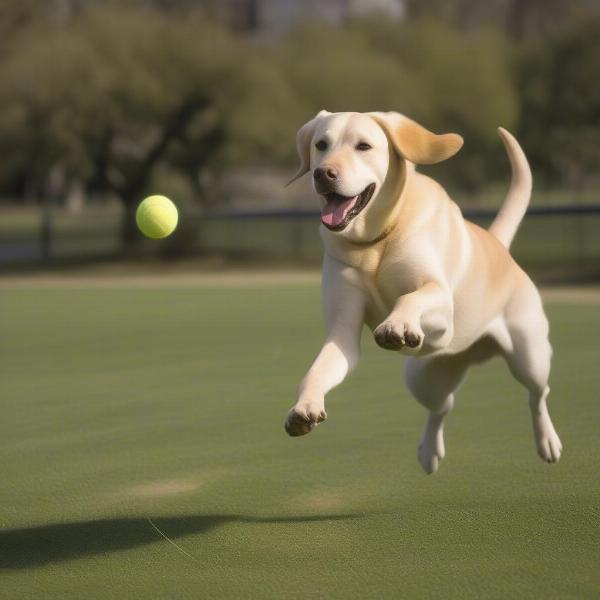The male Labrador Retriever, often simply referred to as a “male lab dog,” is a popular choice for families and individuals seeking a loyal, energetic, and affectionate companion. This comprehensive guide will delve into the specific characteristics of male Labs, covering everything from their temperament and training needs to their health and nutritional requirements. Whether you’re a seasoned dog owner or considering welcoming your first Lab into your home, this guide will provide valuable insights into owning a male lab dog.
Understanding the Male Lab Temperament
Male Labs are known for their playful and outgoing nature. They are generally friendly and eager to please, making them excellent family dogs. While individual personalities vary, male Labs tend to be more boisterous and energetic than their female counterparts. This exuberant energy translates into a love for games, especially fetch and swimming. They are intelligent dogs, quick to learn, but can also be easily distracted, requiring consistent training and positive reinforcement. Their affectionate nature makes them prone to separation anxiety, so it’s crucial to establish a secure and loving environment from an early age.
 Male Lab Playing Fetch
Male Lab Playing Fetch
Training Your Male Lab Dog
Early socialization and consistent training are key to raising a well-behaved male Lab. Their intelligence makes them quick learners, but their high energy levels can make them prone to distractions. Positive reinforcement methods, such as reward-based training, work best. Start with basic obedience commands like sit, stay, and come. Leash training is also essential, as their enthusiasm can sometimes lead to pulling. Consider enrolling your male Lab in puppy classes or obedience training for professional guidance and socialization opportunities.
Health and Care for Male Lab Dogs
Like all breeds, male Labs are prone to certain health conditions. Hip and elbow dysplasia, common in larger breeds, can be minimized through responsible breeding and proper exercise. Bloat is another serious concern, especially after meals. Regular veterinary checkups, a balanced diet, and portion control can help mitigate these risks. Male Labs also require regular grooming to manage their thick double coat, especially during shedding seasons. Brushing their coat weekly will help minimize shedding and keep their skin healthy.
Feeding Your Male Lab
Maintaining a healthy weight is crucial for a male Lab’s overall well-being. Their love for food can lead to overeating, so it’s essential to provide a balanced diet and monitor their intake. Choose a high-quality dog food formulated for large breeds and adjust portions based on their age, activity level, and individual needs. Avoid feeding them table scraps, as this can lead to digestive issues and contribute to obesity. striped dog bed might be a great choice for your lab to relax after a meal.
What to Expect from a Male Lab Puppy vs. an Adult
Male Lab puppies are bundles of energy, requiring plenty of playtime, socialization, and patience. They are prone to chewing and exploring, so puppy-proofing your home is crucial. As they mature, their energy levels may slightly decrease, but their playful nature remains. Adult male Labs still require regular exercise and mental stimulation to stay happy and healthy. They become more settled and affectionate, forming strong bonds with their families.
Is a Male Lab Right for You?
Choosing a male Lab is a significant decision. Their energetic nature requires an active lifestyle and commitment to training. They thrive in environments where they can receive plenty of attention and exercise. If you’re prepared to meet their needs, a male Lab can be a loving, loyal, and rewarding companion. Do you think you could provide a good home for a dog who might need spray that keeps dogs from peeing during training?
Conclusion
The male Labrador Retriever is a wonderful breed known for its loyalty, playful nature, and affectionate personality. Understanding their specific needs, from training and exercise to health and nutrition, is crucial for providing them with a happy and fulfilling life. By following the guidelines in this guide, you can ensure that your male lab dog thrives and becomes a cherished member of your family. Maybe you would consider a leprechaun dog costume for St. Patrick’s Day?
FAQ
- How much exercise does a male Lab need? A male Lab needs at least an hour of exercise per day.
- Are male Labs good with children? Yes, male Labs are generally good with children when properly socialized.
- Do male Labs shed a lot? Yes, male Labs shed seasonally and require regular grooming.
- What are the common health problems in male Labs? Hip and elbow dysplasia, bloat, and eye problems are common health concerns.
- How long do male Labs live? The average lifespan of a male Lab is 10-12 years.
- Are male Labs easy to train? Yes, male Labs are intelligent and eager to please, making them relatively easy to train.
- What is the best food for a male Lab? A high-quality dog food formulated for large breeds is recommended.
ILM Dog is a leading online resource dedicated to providing expert advice and guidance on all aspects of dog care. From breed selection and health information to training tips and product recommendations, we are committed to helping dog owners provide the best possible care for their furry companions. Our expertise covers various areas, including breed selection, health, training, nutrition, grooming, and accessories. We strive to provide valuable resources for dog owners, regardless of their experience level. Contact us for personalized advice at [email protected] or +44 20-3965-8624. ILM Dog is your trusted partner in responsible dog ownership.